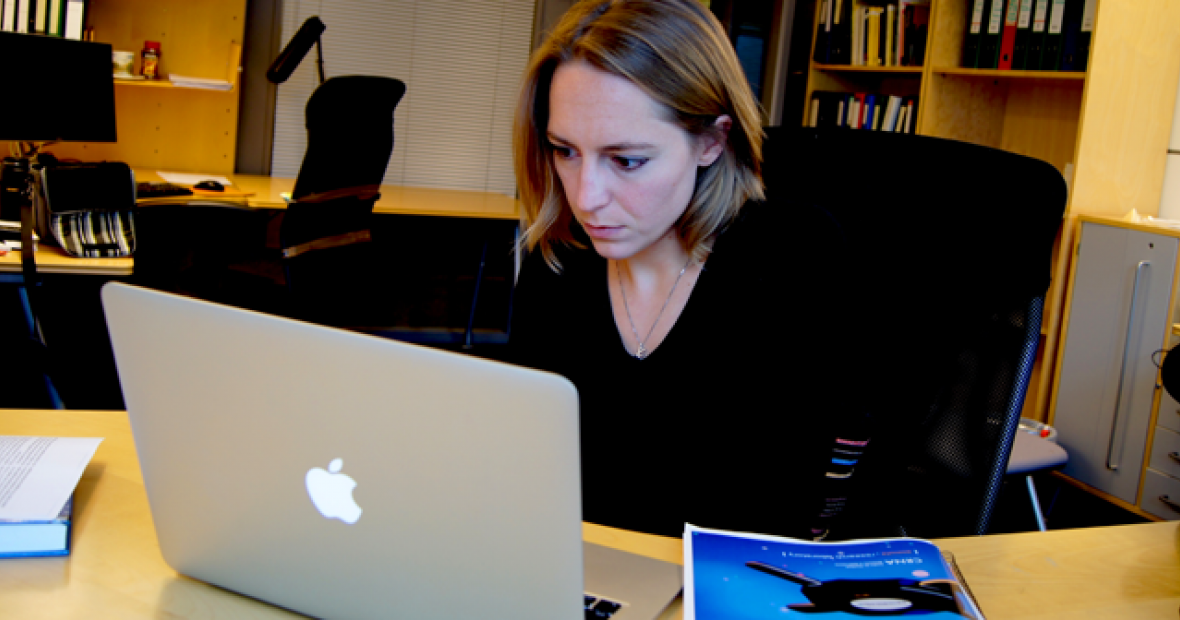Art to Algorithms
“Where do you see yourself in 5, 10 years?” That’s often the eye-rolling question in a first interview.
For Natalie Larson ’06, the quick answers could be “NASA,” “Norway,” and “ ’net congestion” — a few of her hefty résumé builders since graduating with honors as an art major eight years ago.
“At Grinnell, I oscillated between choosing philosophy and studio art as a major, but after taking time off to pursue life as a Carmelite nun (another exploration), and subsequently dealing with many inner philosophical battles, I chose art.” She credits faculty members Bobbie McKibbin, Matthew Kluber, Jill Schrift, and Lesley Wright as influential mentors.
Grinnell, though, came after Larson found a math error on a national standardized test while in high school, but before she discovered a mistake in the GRE, which led to work for The Princeton Review and ACT. These experiences she counts among her “most satisfying to date,” followed quickly by “my internship at Harvard in 2010 and the 2011 program on quantum computing I attended at MIT, which were extremely gratifying. Learning about the strange, mind-bending, humanity-altering potential consequences of quantum computing from foremost researchers was an amazing experience.”
Art to algorithms
What qualified the artist to conduct research in quantum computing? After graduation from Grinnell, philosophy was still on Larson’s mind. “I found myself drawn more and more to logic, eventually realizing that I should just study pure mathematics,” she says.
In 2012, Larson earned a second bachelor’s degree, double majoring in mathematics and computer science with honors from Vanderbilt. She also attended NASA’s Aeronautics Academy, where she wrote software to simulate in-flight Internet usage. Today, she’s in the midst of a Ph.D. program in computer science from the University of California, San Diego.
“In my Ph.D. research I study Internet congestion, both from a technical point of view, and a socio-economic point of view, looking at reasons why networks might be motivated to allow certain pathways to remain congested,” Larson explains.
For example, “In early 2014, we saw especially heavy congestion between Cogent – one of Netflix’s transit providers – and virtually all other service providers with the exception of Cox, which has a special agreement with Netflix. When Netflix agreed to pay Comcast this March, nearly all congestion on paths between Cogent and other service providers disappeared,” Larson says.
“Identifying sources of congestion and finding ways to mitigate them can make the Internet fairer, faster, and more reliable.”
Larson’s research is funded by a Science, Mathematics and Research for Transformation (SMART) Fellowship from the U.S. Department of Defense (DOD), in return for her commitment to work for the DOD the next two summers and at least three years upon completion of her doctorate.
This summer, she’s working at the Simula Research Laboratory in Oslo to analyze congestion in Norwegian mobile broadband networks. And in her spare time, she ran a marathon in Helsinki to prepare for another in Oslo – all leading to her next goal, “my first 100-mile ultra.”
“When I ran my first marathon at Grinnell in 2005, I thought, ‘I’ll be satisfied if I never achieve anything else in running!’ but meeting that goal opened up the possibility for new ones. In 2007 I qualified for the Boston Marathon, and last year completed my first 50-mile ultra. I’ve already run two marathons this year (San Diego and Helsinki) and will run another (Oslo) in less than a month.”
Possible, probable, Grinnell
How is all this possible? Larson makes it sound so, well, Grinnellian. “By emphasizing ‘why’ and ‘how’ questions, holding classes in a discussion format, and heralding the value of many different disciplines and the connections between them, a liberal arts education gives us an appreciation for diversity — of vocations, of opinions, of ways of thinking — and an ability to think exceptionally critically and creatively.” About art, algorithms and Internet congestion.

